- Home
- Peggy Webb
Stars to Lead Me Home: Love and Marriage (A Novel) Page 2
Stars to Lead Me Home: Love and Marriage (A Novel) Read online
Page 2
My building was constructed to last. It has marble floors and marble wainscoting halfway up the walls, and even in my bare feet I make resounding echoes. I like that. Determined sounds. Resolute sounds. A woman marching to the beat of her own drummer.
The door that opens onto the alley is heavy, and so is the bag. I have to use my right shoulder to push my way to freedom.
I stand for a moment on the fire escape, letting my eyes adjust to the darkness. The streets are empty, and there’s just enough light to expose my late night march to the garbage can. I go down the long fire escape, the bag banging against my thigh, bruising it, probably, through my nightshirt. The alley is full of small sharp rocks and bits of broken glass, and when I step in I wish for my shoes.
If I weren’t trying so hard not to cut my feet I would jive down the alley, maybe hum a jazzy tune or two, but for once I use my better judgment.
The garbage can lid is open and I don’t have to stand on tiptoe to see that the enormous container is mostly empty. I reach inside the bag and close my hand around the first secret, pleasure guaranteed if you put the batteries in first.
Well, why not? I sit down right there in the middle of the alley and paw through the bag turning on batteries. Then I take a handful of pulsating pleasure, draw back my arm and wind up. I’ve never had much of an eye for accuracy. Fortunately my target is huge.
I take aim and let go. There is a satisfying thunk as latex meets metal.
“Bingo!” I take out the second secret. Another score. Another guilty pleasure gone.
The next one has a suction base. It lands with a big plop, and I can picture it stuck to the side of the can, all primed with nowhere to go.
This bag is loaded. There are things inside with names you’d die laughing over if you didn’t need them so much.
I throw them all into the garbage can. No upending the bag and dumping for me. I need to rid myself of the secrets one by one. I need to remember why I had bought each one, why I had needed them, and why I am never going to need them again. Never.
Southern from the top of my head to the tips of my toes, I am immobilized by old-fashioned codes of honor, consigned to the world of my parents where married people wouldn’t dare break vows, even if they’re living apart and haven’t touched each other since the Dark Ages. How can I move forward with any part of my life while divorce lawyers haggle over the price of my freedom?
“Are you watching me through your binoculars?” I peer into the dark streets for the sight of a white van, for I’m certain the private detective Jean said my husband hired to dig up dirt on me is out there running up a big bill, which he will present to Dick with the promise that next time he’ll catch me red-handed in my no-good shenanigans.
“What do you make of this?” I wind up with the final toy, one with so many bells and whistles it does everything but sing “Dixie.”
The last tantalizing toy bites the dust, and I laugh all the way up the fire escape and into my apartment. I’m still laughing when I hear sounds in the alley. On my knees beside my window I lift up the edge of the Venetian blind. Jackson’s resident wino is going through the garbage.
In my zealous bid for freedom, I’d forgotten about him. He goes through the garbage every night searching for things he might use, a cast-off pair of socks, a wash cloth with frayed edges, a bit of cheese the rat hasn’t found, a half-eaten pizza somebody didn’t want.
Won’t he be surprised tonight?
I linger by the window a moment, wishing on a star I can barely see because of the city lights. It’s not complicated, this wish. I’d simply like to go to a late night movie without having the white van follow me.
Instead, I grab my latest purchase from my bedside then prowl into the front room of my apartment which serves as kitchen/dining room/living room. My hopeful little Christmas tree sits on a corner table, looking a bit lopsided. I straighten it up, turn on its lights.
“Music. That’s the ticket.” I say this aloud, mostly to shatter this huge quiet. Then I turn on the radio and cozy up in the corner of my sofa with a book titled The Do-It-Yourself Guide for Single Women. I bought it because it promises that anybody can build a gazebo.
If Dick ever signs divorce papers I’m going to have a gazebo. A house, first, of course, but later a gazebo that I can point to and say I built it myself.
I hum along to the music on the radio, a Broadway show tune I’ve always loved, and flip past the first six chapters till I find the one that pictures a white painted gazebo strung with garlands of pink roses.
“Yes!” I pump my fist in the air then get lost in the first sentence. Your tool kit should include a Phillips head screwdriver…Wait a minute. What tool kit? Why do screwdrivers have names and why can’t l use one called Jane?
Obviously, there’s a lot I don’t know about being single and doing it myself. I close the book and grab a wonderful novel by Jodi Picoult then sink into the cushions, immersed in good prose and good music.
Suddenly the music stops and I hear this deep male voice. Hello, night owls. Welcome to another Saturday night with Mr. Fixit.
Intrigued, I close my book. I’m here to solve your problems, he says, and I’m hooked.
We have the first caller. Linda, how can I help you?
Linda has a problem with a stopped up sink and Mr. Fixit solves it in less time than it takes me to heat water, grab a cup and drop in a tea bag.
There’s a quick succession of callers, mostly women. And why not? He has a reassuring manner and a beautiful voice, the kind you’d imagine reading poetry.
I stand in my tiny kitchen alcove with my teacup and debate whether to call. I could ask about the makings of a tool kit and save the gazebo question. In the end I sit on my sofa with my tea and just listen. Somehow, that’s enough.
CHAPTER THREE
I don’t see the white van anywhere Sunday morning, but still I find myself searching for it. Divorce is hard, no matter who leaves first, especially after a long-time marriage. It’s the uprooting of everything I’ve known for half my life. I know I can have another house, another community, another church. I know I still have my girls. At least, I still have my youngest. My oldest is not speaking to me, and hasn’t since I left Dick.
But I won’t think about all that now. I settle into my cocoon to grade papers. I feel a little twinge of guilt when I hear church bells down the street. Soon, I tell myself. I have a temporary home. I don’t want a temporary church, one I’ll leave as soon as I can put the past behind me and start living my life forward. Change is hard for some people, and I just happen to be one of them. Look how long it took me to get up the courage to leave Dick.
By early afternoon I’ve finished the papers. I think about calling to see how Lillian is doing, but I can’t ask her outright because she hates that, and she sees through every one of my ploys. I grab my purse and head out to Home Depot.
The hardware section is as confusing as my do-it-yourself book. There are the Phillips head screwdrivers, but they come in every size known to man. I stand in front of them wishing I’d called Mr. Fixit. Finally I select two that scream we can build a gazebo then grab a hammer for good measure.
Moving on I see fifty million kinds of nails and a gazillion types of screws. There is no way I can navigate this all-male terrain without help. Next Saturday night, I’m definitely calling Mr. Fixit.
I make my purchases and leave Home Depot feeling as successful as if I’ve decided on an expedition to the Tundra.
o0o
There is a moment right before sleep claims you when problems grow exponentially and every doubt you ever had comes flooding back. Did I do the right thing? Could we have worked things out? Would therapy have helped? In my bid for freedom, am I going to lose my oldest daughter?
On the heels of doubt comes fear. Am I capable of starting over at forty? Can I be strong and independent, a woman who can face anything? Oh my God, what if one of those things turns out to be the death of a friend?
I fl
ing my right arm over my face and breathe deeply. The scent of Ivory soap mixes with the fragrance of Jergens lotion and I tell myself to calm down. Life goes on, no matter what.
Alone in my bed I cling to that notion as desperately as sailors lost at sea cling to flimsy life rafts. The phone rings and I race to my sitting room and grab it, as grateful as if I’d been plucked from the middle of the Pacific.
“Maggie? You sound like you’re crying. You’re not, are you?”
It’s Jean. She always grabs a conversation by the throat. And for reasons I will never understand, she prefers to call me on the land line instead of my cell phone.
“Why would I be crying?”
Jean can say more with silence than most people can say in a two-hour gabfest. I can picture her: fuzzy slippers propped on the footstool, jogging pants sporting a hole over the knee that’s in no danger of being mended this century, sweat shirt proclaiming “Housework causes warts,” cigarette burning so close to the filter she’s singed her fingers.
“Give me a break, Maggie.”
Loss is a stone in my heart, but I’m familiar with its size and weight. I’ve learned how to breathe around it. Too much oxygen can kill, and I’m not ready for Jean or anybody else to pluck the stone out.
I make a nest in the corner of the sofa, phone cradled under my chin, slick magazines piled high around me, magazines that tell me how to cook six gourmet desserts featuring real butter and cream right alongside propaganda designed to make me feel guilty about the five extra pounds on my hips.
“Are you smoking?” I say.
“Don’t change the subject.”
“You know what those things to do your lungs. For Pete’s sake, every hallway at school has posters.” I’m on one of my soapboxes, and it’s hard to get off. “I’ll bet you had to stop for breath coming up the stairs today, didn’t you?”
Her silence screams at me to shut up, but I don’t. “I’ll bet you coughed your head off when you went outside to feed your cats after supper, didn’t you?”
All of a sudden I see my daddy laid out in his Sunday suit, skin waxy, lips formed in some unnatural grimace the undertakers insist the departed wear, as if a man who’d spent his last few months besieged by lung cancer had anything to smile about.
When I was a child the first sound I heard in the morning was Daddy coughing long before the sun was up, standing on the front porch in his underwear so he wouldn’t wake the rest of the family.
He was too young to die. Forty-four. Jean’s age, though she’d die before admitting it.
I imagine Jean with her red corkscrew curls askew, her small feet not quit touching the floor, her night owl ways keeping her up long after her husband has gone to bed. Perky, some people might call her, but she can’t be captured in a single word. She’s alive in a way that few people are, alive with curiosity and intellect, with humor and compassion, alive in a way that makes her look as if a fire has been lit somewhere deep inside, the glow of it showing in her eyes, her quick movements, her lively wit.
She’s been a part of my life forever. Not only did we share the same sandbox as children, but we shared the same set of relatives - the eccentric aunts, the hot-tempered uncles, the cousins we hated, the ones we loved. We learned how to entertain ourselves on long hot summer days in Mississippi, building fairy houses in the woods on our grandfather’s farm, Jean pretending to be the fairy queen and me relegated to the role of princess if she was in a good mood and a servant if she was not.
Both rebels, Jean and I were constantly in hot water, a trend that continued right up through my teen-age pregnancy and my dead-of-the-night move from a husband who had turned into a stranger.
I’m tired of hot water. I want to just float around in a nice safe pool and study the stars.
“I don’t know why you’re worrying about me, Jean. For Pete’s sake, we might lose Lillian.” I grip the phone, white-knuckled, remembering how she can no longer climb stairs to my apartment without panting, how her face goes pale at the least little exertion, even getting up from the sofa in the teacher’s lounge to put money in the drink machine. “I don’t want to lose you, too.”
“We are not going to lose Lillian. I won’t have it. And I’m too mean to die.” The way Jean says it, the entire Wikipedia is wrapped up in her pep talk. “Get yourself down here. I won’t even have to change sheets in the spare room. They’re already clean. . . Maggie? For Pete’s sake, Maggie, are you laughing?”
I am. That’s how it is with me these days. I can go from tears to mirth in a split second and never even know how I got there.
“I was just thinking about my black and white stripped bag,” I say.
“The one I’m supposed to snatch when you die so your children won’t find it when they go through your things?”
“That’s the one, only now I can’t hold it over your head. I can’t say that if you die first I won’t have anybody to destroy the proof that once upon a time I had a healthy libido.”
“Don’t tell me you misplaced it.”
“Even better. I destroyed it and everything in it.”
By the time I finish telling Jean the story, she’s laughing so hard she starts wheezing. “On my God, you’ve got to call Lillian. She’ll crack up.”
It doesn’t take much for Lillian to crack up, even after waiting for a heart that never comes. Tall, gorgeous, blond, skinny, a state Jean and I have aspired to for the last six years, me with some success and Jean with none at all, Lillian at first glance is not the kind of woman you’d imagine being a part of our inner circle. But when we first heard her big bray of laughter echoing through the hallways of Jefferson Street Elementary, we figured we’d found a soul mate.
Lillian removed all doubts on our first road trip together: three of us, driving to a teacher’s conference in Natchez, armed with good intentions and four bags of no-fat pretzels.
Six miles out of Jackson, Lillian kicked off her shoes, dug into the pretzels and drawled, “I’d as soon go to a tooth pulling as listen to these pompous idiots who call themselves experts just because they’ve come up with some hair brained scheme to teach children without the pain of studying.”
That first day we did all the proper things, attended the meetings and listened to the theories, some good, some crackpot. But back in the room, Lillian opened a big bottle of cheap red wine and tossed a pack of cards onto the bed.
“Anybody for wine and bridge?” she said.
“Who’s the fourth?” I asked.
“I’ll play partners with myself.” The cards whirred as Lillian shuffled them.
“I think there’s something illegal about that, Lillian.” Jean slugged down the wine. “I get to cut the cards.”
“You always cut the cards,” I tell her.
Jean swatted me then cut the deck. “Deal, Lillian.”
“I have to warn you,” she said. “I cheat.”
She did, blatantly, and we all roared with laughter.
After that we called ourselves Wonder Women, staid by day and outrageous caped crusaders by night.
“Crusaders for debauchery,” Jean said.
“Or is that depravity?” I ask.
“Anything but defeat.” This from Lillian, flashing that open smile that stretched the freckles on her cheeks.
And I’d watched her envious, wondering if she’d know defeat if it rose out of a scum pond and twined itself around her slender ankles.
I was wrong, of course, as I have been wrong about so many things. Marrying Dick, for instance. Jean says I’m too hard on myself, that I was just a scared teenager and thought marriage was the only option I had. Furthermore, she said anybody would believe a man who looks like a Christmas puppy when he smiles could fool you into believing he meant every word when he promised to love and cherish you for the rest of your natural life, and then some.
Not only did he break his promise; he tried to break me, too. I stayed, thinking I could fix it, the faux fairytale that had become a nightmare, stayed too l
ong some said.
But who can read the map of someone else’s life?
Anything but defeat, Lillian had said on that road trip so long ago, never knowing that it would become our battle cry.
That’s why she still plays tennis and why Jean and I sit down to rest every time she does, both of us pretending to be tired or sleep-deprived or coming down with a cold.
And that’s why I won’t tuck my tail between my legs and race down to Jean’s for the rest of the night, even though the comfort of being under the same roof with people who love me unconditionally is appealing.
Now Jean is saying, “Bill will cook biscuits just for you.”
“I know he will.” Bill’s one of the good guys, a model husband and a good friend as well as my CPA. And though I know Jean only wants what’s best for me, I’m past the point of letting other people make that decision for me. Even my best friends. “But I’ve got to learn to stand on my own two feet.”
Not an easy thing for a woman who got pregnant and married in high school then earned a teaching degree only because Dick gave his grudging stamp of approval. I’ve spent more than half my life listening to other people tell me what to do.
“All right, Maggie. I’m not going to argue with you.”
“Good. Don’t. “
I’ve had enough arguing to last a lifetime. Dick could turn a simple Sunday dinner into a full-fledged war.
“I’m doing great, Jean,” I add, hoping to deflect the sympathy I feel building on the other end of the line. Not that I don’t enjoy comfort and hugs. But at the moment I’m close to losing control again: the least bit of comfort will tip me over the edge.
“Maggie, I don’t like to think of you alone like this.”
“Don’t worry. I’m through crying. When I threw away my bag of tricks I also threw away the crying towel.”
“Great. That means you’ll be all fresh-faced and gorgeous for the dance.”
“What dance?”
“New Year’s Eve, and don’t you dare say no.”
Though I live alone and support myself, I am still legally married, and in a Southern town, being seen in public with another man is tantamount to adultery, if not in the eyes of the law, certainly in the view of Dick and his team of lawyers.

 Magnolia Wild Vanishes (A Charmed Cat Mystery, Book 1)
Magnolia Wild Vanishes (A Charmed Cat Mystery, Book 1) Just One Look
Just One Look SAVAGE BEAUTY
SAVAGE BEAUTY Elvis and the Devil in Disguise (A Southern Cousins Mystery With Bonus Charmed Cat Mystery)
Elvis and the Devil in Disguise (A Southern Cousins Mystery With Bonus Charmed Cat Mystery) Elvis and the Blue Suede Bones
Elvis and the Blue Suede Bones Flying Lessons
Flying Lessons The Smile of an Angel
The Smile of an Angel Any Thursday (Donovans of the Delta)
Any Thursday (Donovans of the Delta) Stars to Lead Me Home: Love and Marriage (A Novel)
Stars to Lead Me Home: Love and Marriage (A Novel) Bittersweet Passion
Bittersweet Passion Donovan’s Angel
Donovan’s Angel Valley of Fire (The Mississippi McGills)
Valley of Fire (The Mississippi McGills) Summer Hawk
Summer Hawk Force Of Nature
Force Of Nature Christmas in Time
Christmas in Time The Dixie Virgin Chronicles: Bea (Book 4)
The Dixie Virgin Chronicles: Bea (Book 4) The Dixie Virgin Chronicles: Molly (Book 3)
The Dixie Virgin Chronicles: Molly (Book 3) Gray Wolf's Woman
Gray Wolf's Woman Dark Fire
Dark Fire Duplicity
Duplicity The Accidental Princess
The Accidental Princess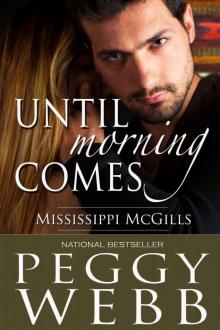 Until Morning Comes (The Mississippi McGills)
Until Morning Comes (The Mississippi McGills) Hallie's Destiny (The Donovans of the Delta)
Hallie's Destiny (The Donovans of the Delta)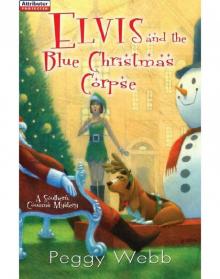 Elvis and the Blue Christmas Corpse
Elvis and the Blue Christmas Corpse Standing Bear's Surrender
Standing Bear's Surrender Warrior's Embrace
Warrior's Embrace Elvis and the Pink Cadillac Corpse (A Southern Cousins Mystery, Plus Bonus Recipes)
Elvis and the Pink Cadillac Corpse (A Southern Cousins Mystery, Plus Bonus Recipes) A Prince for Jenny
A Prince for Jenny The Dixie Virgin Chronicles: Janet (Book 2)
The Dixie Virgin Chronicles: Janet (Book 2) MM03 - Saturday Mornings
MM03 - Saturday Mornings The Mona Lucy
The Mona Lucy The Christmas Feast
The Christmas Feast Higher Than Eagles (Donovans of the Delta)
Higher Than Eagles (Donovans of the Delta) Jack Loves Callie Tender
Jack Loves Callie Tender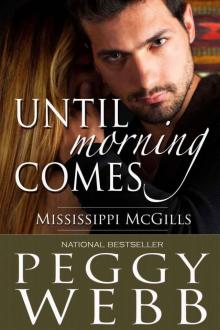 MM02 - Until Morning Comes
MM02 - Until Morning Comes MM01 - Valley of Fire
MM01 - Valley of Fire Can't Stop Loving You
Can't Stop Loving You Secret Goddess Code
Secret Goddess Code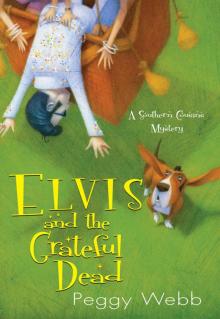 Elvis and the Grateful Dead
Elvis and the Grateful Dead Elvis And The Memphis Mambo Murders
Elvis And The Memphis Mambo Murders Touched by Angels
Touched by Angels The Dixie Virgin Chronicles: Belinda (Book 1)
The Dixie Virgin Chronicles: Belinda (Book 1) Sleepless Nights (The Donovans of the Delta)
Sleepless Nights (The Donovans of the Delta) Saturday Mornings (The Mississippi McGills)
Saturday Mornings (The Mississippi McGills)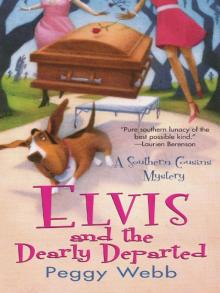 Elvis and The Dearly Departed
Elvis and The Dearly Departed Phantom of Riverside Park
Phantom of Riverside Park